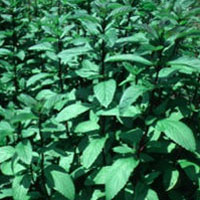Penn Herb Wellness Guide
PeppermintFind Products
 © Steven Foster
© Steven FosterSide Effects
Peppermint tea is generally considered safe for regular consumption. Peppermint oil can cause burning and gastrointestinal upset in some people.13 It should be avoided by people with chronic heartburn, severe liver damage, inflammation of the gallbladder, or obstruction of bile ducts.14 People with gallstones should consult a physician before using peppermint leaf or peppermint oil. Some people using enteric-coated peppermint capsules may experience a burning sensation in the rectum. Rare allergic reactions have been reported with topical use of peppermint oil. Peppermint oil should not be applied to the face—in particular, the nose—of children and infants. Peppermint tea should be used with caution in infants and young children, as they may choke in reaction to the strong menthol. Chamomile is usually a better choice for this group for treating colic and mild gastrointestinal complaints.
Copyright 2025 TraceGains, Inc. All rights reserved.
Learn more about TraceGains, the company.
The information presented by TraceGains is for informational purposes only. It is based on scientific studies (human, animal, or in vitro), clinical experience, or traditional usage as cited in each article. The results reported may not necessarily occur in all individuals. Self-treatment is not recommended for life-threatening conditions that require medical treatment under a doctor's care. For many of the conditions discussed, treatment with prescription or over the counter medication is also available. Consult your doctor, practitioner, and/or pharmacist for any health problem and before using any supplements or before making any changes in prescribed medications. Information expires December 2025.


